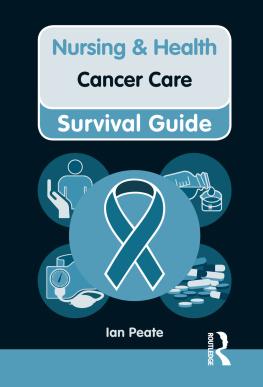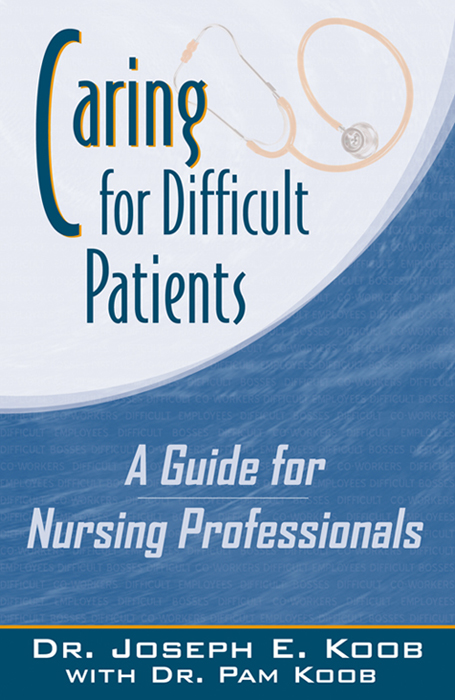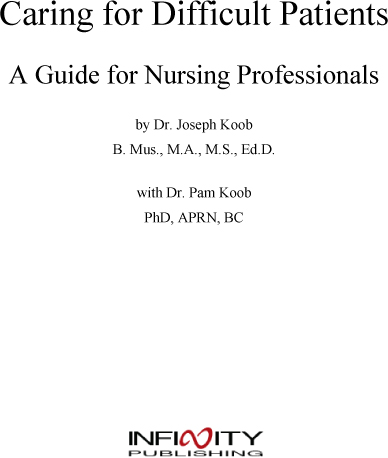Copyright 2007 by Dr. Joseph Koob with Dr. Pam Koob
First Edition
Preface
Professionalism and Caring
I believe that the Nursing profession is one of the most admired in America. We think of Nurses as being professional. That is, they have a knowledge base and skill set that is unique and valued and that the quality of their work is important to them. We also, very importantly, think of Nurses as people who care about their patients they are concerned with our well-being when we are under their care. These considerations are the focal point for our discussion on how to best deal with difficult patients.
This book will specifically consider the concerns that arise when Nurses encounter patients who are difficult. While we will very briefly consider other important relationships Nurses have in the work place their peers, Nursing Supervisors, and Physicians the emphasis here will be on the unique relationship that develops when a Nurse interacts with a client, a patient.
This is a key consideration. A patient, either directly or indirectly, is a customer. A Nurse is the service provider. As such, certain parameters are automatically set up that create general guidelines for action. The customer expects to be treated in a certain way; the Nurse is expected to provide a certain type of service. Boundaries, whether written or tacit, are drawn as a result. Both the Nurse and the patient are expected to interact appropriately and considerately within those parameters.
Patients/customers expect you, the Nurse, to be professional; and in a sense that is far more important than most other service professions, they expect you to care. The focus of this book is to demonstrate how you, the Nursing professional, can use these two key concepts professionalism and caring to your advantage and to the patients advantage in dealing with difficult concerns.
Yes, there will always be difficult people we have to deal with both professionally and non-professionally. While I am not a Nurse, I have written many books about Understanding and Working with Difficult People and in Difficult Situations. I do have an intimate knowledge of the Nursing profession from Nursing professionals, research, and study. Dr. Pam Koob, whose input has been invaluable to the writing of this book, is a consummate Nursing Professional with years of caring experience at all levels of Nursing and in many different hands-on experiential situations. Her work experience includes, but is not limited to: general care, Nurse Practitioner, ER, Hospital, University-level teaching, and Wound Care Nursing.
Note: Dr. J. Koobs books, Succeeding with Difficult Coworkers, Succeeding with Difficult Bosses, and Dealing with Difficult Customers, all have detailed considerations in working with these specific types of relationships and concerns.
Addendum
Nurses/Nursing and Physicians will be capitalized throughout this text as a respectful gesture to two quality service professions.
Use of gender: I typically use gender indiscriminately. Men and women can be equally difficult and I make every effort to avoid assigning characteristics to one gender or another.
Approaching this book
As a long time educator and author of educational materials I try to organize information in the most easily accessible manner for everyone. As you will see, this book presents concepts in a broad outline fashion that serves to emphasize Key Ideas and Terminology. Materials are presented in sections and sub-sections that are laid out to emphasize relationships between major points, definitions and explanations, as well as knowledge, understandings, skills, and tools. Optional exercises and provocative questions are provided at the end of each Chapter as a means to extend your personal growth and understanding of the ideas presented.
Thanks
My Special Thanks to Pam Koob, my stepmother and co-author; my readers Lisa, my beautiful wife; Anne Duston, editor extraordinaire; Allison Gold, R.N., M.A.; Amy Arneric, R.N., B.S.N.; Nathan, my son and graduate English major, for their help with this project.
Part I
Introduction
The delivery of high quality care depends increasingly on processing skills (communication, empathy, willingness to listen, common goals, ability to find alternative ways of solving problems, etc.) in addition to medical/care competence.
(Skjorshammer, Scandinavian J Caring Sci, 1999)
Chapter 1
Key Ideas
TLC
Authors Note: I truly believe that the phrase Tender Loving Care is how the patient, and this is a key point, sees the Nursing profession. However you, as a professional, consider or interpret this, it is important to always keep in mind what patients think and expect. Patients not only expect you to be a consummate professional, they expect you to care something that can be interpreted in a variety of ways:
To give them quality Nursing care
To care about how they feel, what they think, who they are
To care about making them better
To care that they are a fellow human being and you are intimately involved with their well-being for this moment in time
In some ways this is a heavy extra burden that is placed on your profession. How you approach this expectation, especially with difficult patients, can make all the difference in how that patient behaves, reacts, acts, and generally deals with you and others involved with his/her care.
How you as a professional handle this important preconception of patients is a major emphasis in this book (see ).
Professionalism
Nursing is a service profession. Patients see you as a professional and they expect you to act in a professional and caring manner.
In a sense that is almost an oxymoron. How can you be expected to be completely professional, do an outstanding job, and yet balance on that delicate thread of propriety and come across as caring as well?
Is it possible for you to balance the two?
Yes, it is possible. AND it is essential if you wish to be acknowledged as the best in a quality profession, and if you expect to be able to handle those difficult cases.














